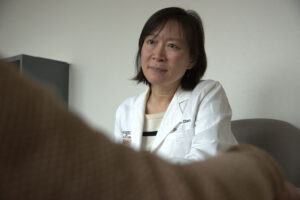Study supports urging smoking-cessation treatment to patients in cancer care
National study shows cancer centers help patients stop smoking
 Getty Images
Getty ImagesA nationwide team studied 44,000 smokers at 28 cancer centers. The researchers learned that if they could get those patients into evidence-based therapy — such as nicotine replacement, counseling or both — they could help nearly one in five kick the habit and, in doing so, improve the effectiveness of the cancer therapy and boost the patients’ cancer survival rates.
New research involving 28 National Cancer Institute (NCI)-Designated Cancer Centers, including Siteman Cancer Center at Barnes-Jewish Hospital and Washington University School of Medicine in St. Louis, indicates it’s both possible and helpful to get cancer patients who smoke into evidence-based tobacco-treatment programs as part of their cancer care.
Studying data involving almost 700,000 patients at the 28 NCI-Designated Cancer Centers, a team of researchers found that it’s beneficial to integrate tobacco treatment into cancer centers’ routine cancer care.
The findings are published Dec. 6 in the Journal of Clinical Oncology.
“We know that people are more likely to quit smoking when they receive treatment, and we know that quitting smoking improves survival and makes cancer treatment more effective; what we didn’t know until now was whether smoking-cessation treatment could be delivered to these patients in cancer centers successfully,” said senior author Li-Shiun Chen, MD, an associate professor of psychiatry at the School of Medicine.
After screening cancer patients to learn whether they smoke, the researchers identified more than 44,000 smokers at the cancer centers. The researchers discovered that if they could get those patients into evidence-based therapy — such as nicotine replacement, counseling or both — they could help nearly one in five kick the habit and, in doing so, improve the effectiveness of their cancer therapy and boost the patients’ cancer survival rates. Quitting smoking doubles the survival rate for cancer patients and lowers the risk of cancer recurrence, no matter the stage of the cancer.
“Patients receiving tobacco treatment were two to three times more successful in quitting than untreated people, and cancer treatment was significantly more likely to succeed in those who quit smoking,” said first author Sarah D. Hohl, PhD, of the University of Wisconsin – Madison.
A national effort called the Cancer Center Cessation Initiative was established as part of the Cancer Moonshot project. In this new study, researchers successfully screened 96% of cancer patients at the 28 NCI-Designated centers participating in the initiative.
“This is the first time that we have gathered this kind of evidence from so many cancer centers,” said Chen. “We didn’t attempt to impose a one-size-fits-all treatment program but instead encouraged centers to do what they thought would work best to get their patients into treatment for smoking.”

There’s still a long way to go. Overall, only about one in seven (15%) patients ends up receiving treatment to curtail tobacco use. But among those who did, almost one in five (18%) succeeded in quitting or severely curtailing tobacco use.
“Tobacco has been kind of a back burner issue at many cancer centers, where the main focus is on treating the consequences of cancer, but we know that quitting smoking helps, regardless of the cancer’s stage, and we believe there are low-burden, cost-effective strategies to help patients do that,” Chen said.
She recently led a single-center effort at Siteman Cancer Center in which researchers used a point-of-care model and electronic health records to identify smokers and then offered them smoking-cessation interventions during regular appointments to receive cancer treatment. That effort increased the percentage of patients receiving smoking-cessation treatment at Siteman from about 2% at the start of the study to nearly 30%. Meanwhile, the percentage of cancer patients at Siteman who quit successfully — meaning they went at least six months without smoking — increased from about 12% to more than 17%.
Chen said the Siteman program demonstrated it was possible for the point-of-care model to help cancer patients quit smoking. She said the goal of this larger, national study was to allow cancer centers to design strategies that work best for their particular patient populations – urban or rural cancer patients, for example, or patients from specific racial or ethnic groups — to see whether specific approaches might work better at one cancer center than another. Chen said it’s unlikely a cookie-cutter approach to smoking cessation would work at each of the nation’s dozens of centers.
“We’re poring over data from the individual centers in this study to look at exactly what they’ve done and to determine what seems to work and what seems not to work,” Chen explained. “We want to identify strategies that can be tailored to specific cancer centers to best help their specific patient populations.”







